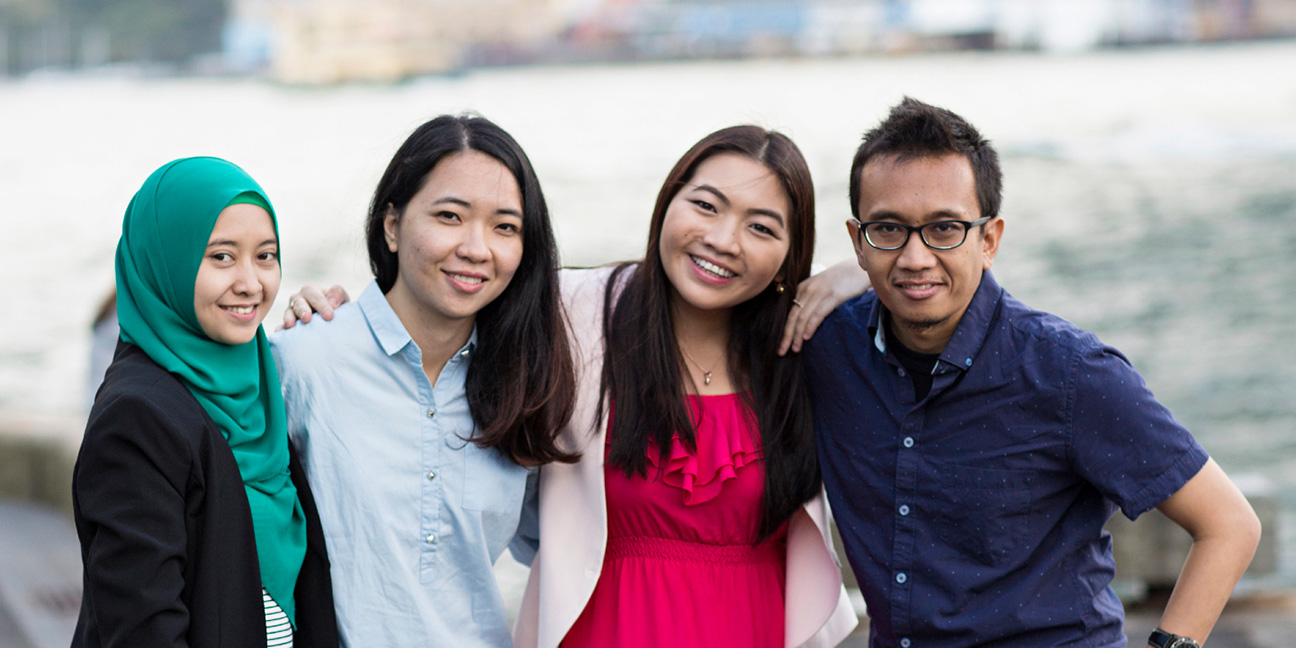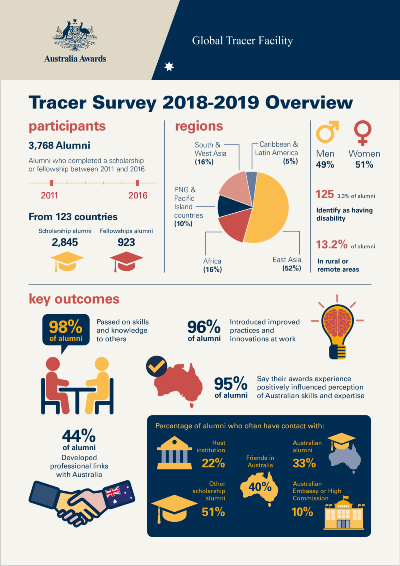
Fostering international cooperation and development
Research 9 Apr 2020 6 minute readResearch confirms the Australia Awards are improving work practices and supporting gender equality and inclusiveness in alumni’s home countries.
Results from the third Australia Awards Global Tracer Facility survey show the awards – government-funded scholarships and fellowships provided to international recipients – are broadly achieving their intended long-term outcomes of contributing to development, cooperation and positive views of Australia, and to a lesser extent ongoing professional partnerships.
Led by the Australian Council for Educational Research (ACER) with funding from the Department of Foreign Affairs and Trade (DFAT), the Australia Awards Global Tracer Facility was established in 2016 to monitor and evaluate the development contributions and public and economic outcomes of Australia’s investment in the Australia Awards.
The Facility collects information about the way in which alumni have used the skills and knowledge gained during their scholarship to progress development in their countries and strengthen networks with Australia. Particular areas of interest include understanding pathways following graduation, the contributions alumni have made to sustainable development in their home countries, and the public diplomacy benefits Australia has yielded from a global network of enriched award recipients.
The Year 3 Survey focused on alumni who completed their scholarship or fellowship between 2011 and 2016. A total of 3768 alumni from 123 countries completed the online survey, with 517 taking part in a follow-up telephone interview.
The results of the survey have been summarised in an infographic.
As with the previous two Tracer Surveys, an overwhelming majority of alumni indicated that they are passing on skills and knowledge (98 per cent of alumni) and introducing improved practices and innovations through their work (96 per cent of alumni).
The most common ways of passing on skills and knowledge indicated by alumni were through:
- training and mentoring within their workplaces to develop capabilities of colleagues
- formal teaching in their role as educators in schools, universities and technical colleges
- implementing reforms and new approaches in their workplace.
Most alumni (73 per cent) agree or strongly agree that their scholarship or fellowship has led to their building networks with Australians and Australian organisation. Examples of the types of contact and cooperation experienced post-award suggest that alumni interactions with Australians predominantly occur through informal social networks.
A smaller proportion of alumni (44 per cent) had developed professional links with an Australian educational institution, organisation or business. The four most common types of professional links in order of prominence were Australian universities, national and state government departments, NGOs, and the private sector.
The main barriers to developing links with Australian institutions and organisations identified by alumni were:
- lack of opportunities to network, both while in Australia and after returning home
- not having time to devote to building partnerships
- lack of awareness or information about how to make connections.
Despite these issues, most alumni indicated that they developed more positive views of Australia as a country, Australian people, and the knowledge, skills and expertise of Australians while on their award.
In relation to the Australia Awards’ aims to address issues of gender equality and disability inclusiveness, the survey found that alumni are making a positive contribution in both respects. Alumni are contributing to gender empowerment in their home countries through advocacy, implementation of policy and programs, and mentorship of young women. Examples of alumni working on initiatives to increase inclusiveness for people with a disability included involvement in policy development, training and mentoring, and the implementation of programs or activities designed to promote inclusiveness of persons with a disability.
The completion of the Year 3 Survey means that DFAT now have data from more than 6500 alumni, spanning completion years from 1996 to 2016, to measure the extent to which the long-term outcomes of the Australia Awards are being met, and explore the factors that have helped or hindered alumni in their achievements post award.
In 2020, the Facility will examine this dataset in more detail, and produce a Global Report to summarise outcomes and offer insight for further strengthening the impact of the Australia Awards. ■
Find out more:
Find the full Tracer Survey Year 3 report here: https://www.dfat.gov.au/people-people/australia-awards/Pages/australia-awards-global-tracer-facility-tracer-survey-alumni-2011-2016.
For further information about the Australia Awards, visit the Department of Foreign Affairs and Trade website.
